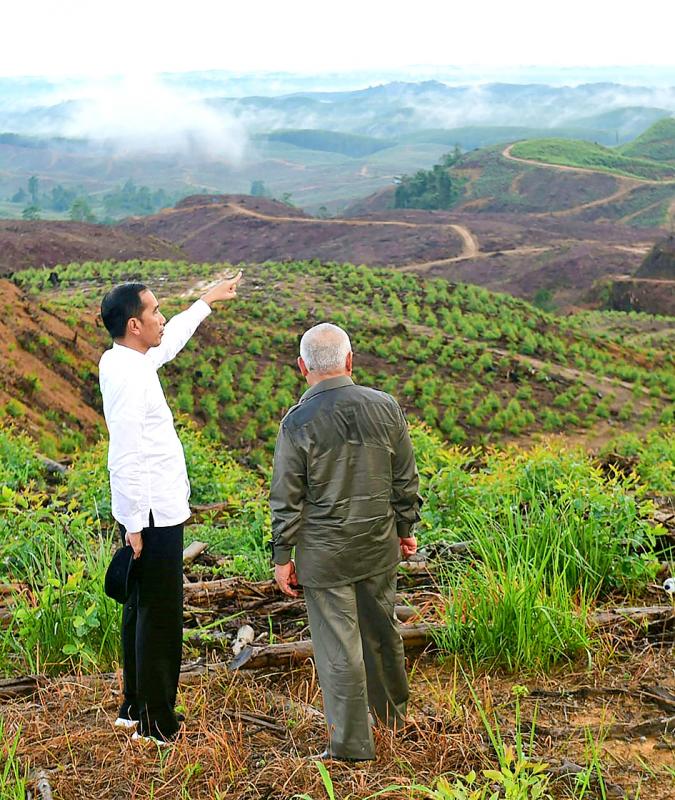Indonesia said that Hon Hai Precision Industry Co (鴻海精密) is considering investing in the country’s new capital city, a move that would bolster the US$34 billion construction project.
Hon Hai, which is known as Foxconn Technology Group (富士康科技集團), is looking at setting up an electric bus system and an Internet of Things network at Nusantara, as Indonesia’s new capital is to be called, Indonesian Minister of Investment Bahlil Lahadalia said in a statement yesterday.
Hon Hai chairman Young Liu (劉揚偉) met with Indonesian President Joko Widodo on Saturday to discuss the company’s plan to invest US$8 billion to build a manufacturing plant with electric scooter start-up Gogoro Inc (睿能創意).

Photo: AFP via the Indonesian Presidential Palace
The factory, set to be built in Central Java province, would produce batteries and other products related to electric vehicles (EV).
Liu told Widodo that Hon Hai is happy to help Indonesia set up talent-training institutions, and it would provide EV technologies and products to local partners and work with them to build an EV ecosystem, the company said in a statement on Saturday.
Liu and Widodo also talked about batteries and renewable energy, and exchanged ideas about the electric mobility industry, it said.
Indonesia is seeking to capitalize on its large reserves of nickel, a key component in batteries, to develop an EV industry.
The Indonesian government is planning to relocate its capital from Jakarta on the island of Java Island to the island of Borneo, where it plans to build a “green” city that relies mostly on public transport and only uses renewable energy.

Quanta Computer Inc (廣達) chairman Barry Lam (林百里) is expected to share his views about the artificial intelligence (AI) industry’s prospects during his speech at the company’s 37th anniversary ceremony, as AI servers have become a new growth engine for the equipment manufacturing service provider. Lam’s speech is much anticipated, as Quanta has risen as one of the world’s major AI server suppliers. The company reported a 30 percent year-on-year growth in consolidated revenue to NT$1.41 trillion (US$43.35 billion) last year, thanks to fast-growing demand for servers, especially those with AI capabilities. The company told investors in November last year that

Taiwanese suppliers to Taiwan Semiconductor Manufacturing Co. (TSMC, 台積電) are expected to follow the contract chipmaker’s step to invest in the US, but their relocation may be seven to eight years away, Minister of Economic Affairs J.W. Kuo (郭智輝) said yesterday. When asked by opposition Chinese Nationalist Party (KMT) Legislator Niu Hsu-ting (牛煦庭) in the legislature about growing concerns that TSMC’s huge investments in the US will prompt its suppliers to follow suit, Kuo said based on the chipmaker’s current limited production volume, it is unlikely to lead its supply chain to go there for now. “Unless TSMC completes its planned six

Intel Corp has named Tasha Chuang (莊蓓瑜) to lead Intel Taiwan in a bid to reinforce relations between the company and its Taiwanese partners. The appointment of Chuang as general manager for Intel Taiwan takes effect on Thursday, the firm said in a statement yesterday. Chuang is to lead her team in Taiwan to pursue product development and sales growth in an effort to reinforce the company’s ties with its partners and clients, Intel said. Chuang was previously in charge of managing Intel’s ties with leading Taiwanese PC brand Asustek Computer Inc (華碩), which included helping Asustek strengthen its global businesses, the company

Power supply and electronic components maker Delta Electronics Inc (台達電) yesterday said second-quarter revenue is expected to surpass the first quarter, which rose 30 percent year-on-year to NT$118.92 billion (US$3.71 billion). Revenue this quarter is likely to grow, as US clients have front-loaded orders ahead of US President Donald Trump’s planned tariffs on Taiwanese goods, Delta chairman Ping Cheng (鄭平) said at an earnings conference in Taipei, referring to the 90-day pause in tariff implementation Trump announced on April 9. While situations in the third and fourth quarters remain unclear, “We will not halt our long-term deployments and do not plan to